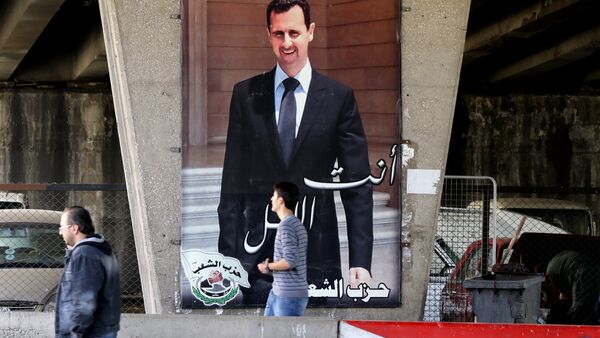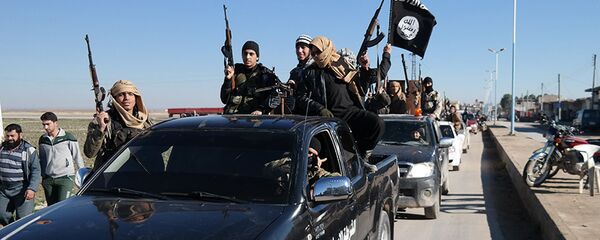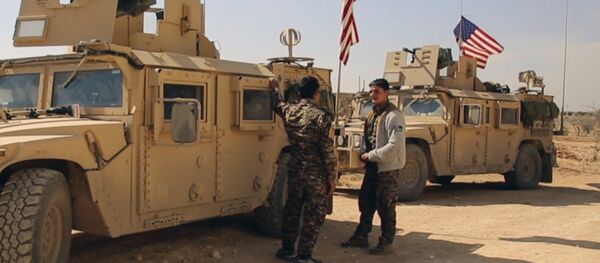WASHINGTON (Sputnik) — The US government would be happy to allow the Syrian army to complete the job of destroying the infamous terrorist group Daesh (ISIS), but still hopes to topple the Damascus government, analysts told Sputnik.
The United States does not care whether the Syrian forces or US-backed forces destroy Daesh in their last remaining strongholds in Syria, Joint Staff Director Lt. Gen. Kenneth McKenzie told reporters on October 5. McKenzie stressed that the US priority was completing the elimination of Daesh in the Euphrates River Valley.
US Fears of Daesh Override Hatred of Russia
McKenzie's comments reflected the continuing widespread hatred and fear of Daesh both in Washington's official circles and among the US public, author and political activist David Swanson explained.
"The US public hates and fears Daesh at least as much as it does Russia, probably more so," he said. "Knives are scarier than nuclear weapons."
Concern over Daesh was widespread enough that it even superseded the establishment's efforts to demonize Russia, Swanson observed.
However, even those who were prepared to tacitly cooperate with Russia and Syria on destroying the terrorist group still hoped to maintain their all-out politicalattacks on President Donald Trump at the same time, Swanson cautioned.
US policy on Syria would have remained basically divided if the long-standing goal of toppling President Bashar Assad has not been abandoned by the Washington foreign policy elite, Swanson warned.
"For the past three years or so, this goal of ‘destroying’ Daesh, rather than the Syrian government, has been a prominent pretense in Washington, while some in decisive positions have clearly prioritized overthrowing Syria," he said.
There was also evidence that the US government had backed a policy of playing off Daesh against the Syrian government and preventing either side from winning an outright victory in order to exhaust both parties, Swanson observed.
"Others have clearly backed a policy of encouraging the two sides to kill and destroy as much as they can without either side winning," he said.
US Confused Over Strategic Goals in Syria
Foreign affairs analyst and political commentator Dan Lazare agreed that US policy on Syria was not fixed on a single, clear-cut goal but oscillated between the aims of toppling Assad and eliminating Daesh, causing widespread confusion.
"US policy in Syria is such a ball of confusion at this point; it's difficult to say what [General McKenzie’s] statement means. The possibilities are nearly endless," he said.
"However, this is difficult to square with Trump's UN speech two weeks ago, in which he described the Syrian government as a ‘criminal regime.’ This suggests that Trump's hostility to Assad is undiminished," he said.
In that case, Trump still very much cared whether the Syrian president emerged from the battle for Deir ez-Zor covered in glory, Lazare noted.
However, it was also possible that the Trump administration was happy to see the Syrian Arab Army tie itself down in Deir ez-Zor fighting Daesh, Lazare suggested.
That could "give US-backed forces a free hand in seizing Syrian oil fields farther to the east," he said.
Moreover, it was also possible that Trump wanted Syria to carry the burden of eliminating Daesh because he wanted to focus US military forces on a possible full-scale war against North Korea, Lazare advised.
"With his notoriously short attention span, Trump may simply have grown tired of the Syria debacle while he concentrates on North Korea instead. This could be the meaning of… the cryptic comment that a White House gathering of top Pentagon brass was just ‘the calm before the storm,’" he said.
McKenzie’s comment could also just have reflected the latest state of confusion in the Department of Defense over Trump’s priorities and policy on Syria, Lazare remarked.
McKenzie could also have been commenting on behalf of top Defense Department officials without clearing it with Trump, Lazare commented.
In that case, "the Pentagon is speaking for itself toppling and doesn't know what the White House is up to… If so, the policy split continues to deepen."
With Secretary of State Rex Tillerson and Secretary of Defense James Mattis both sending conflicting signals with regard Iran and North Korea, the Defense Department might just be reflecting that confusion, Lazare concluded.




